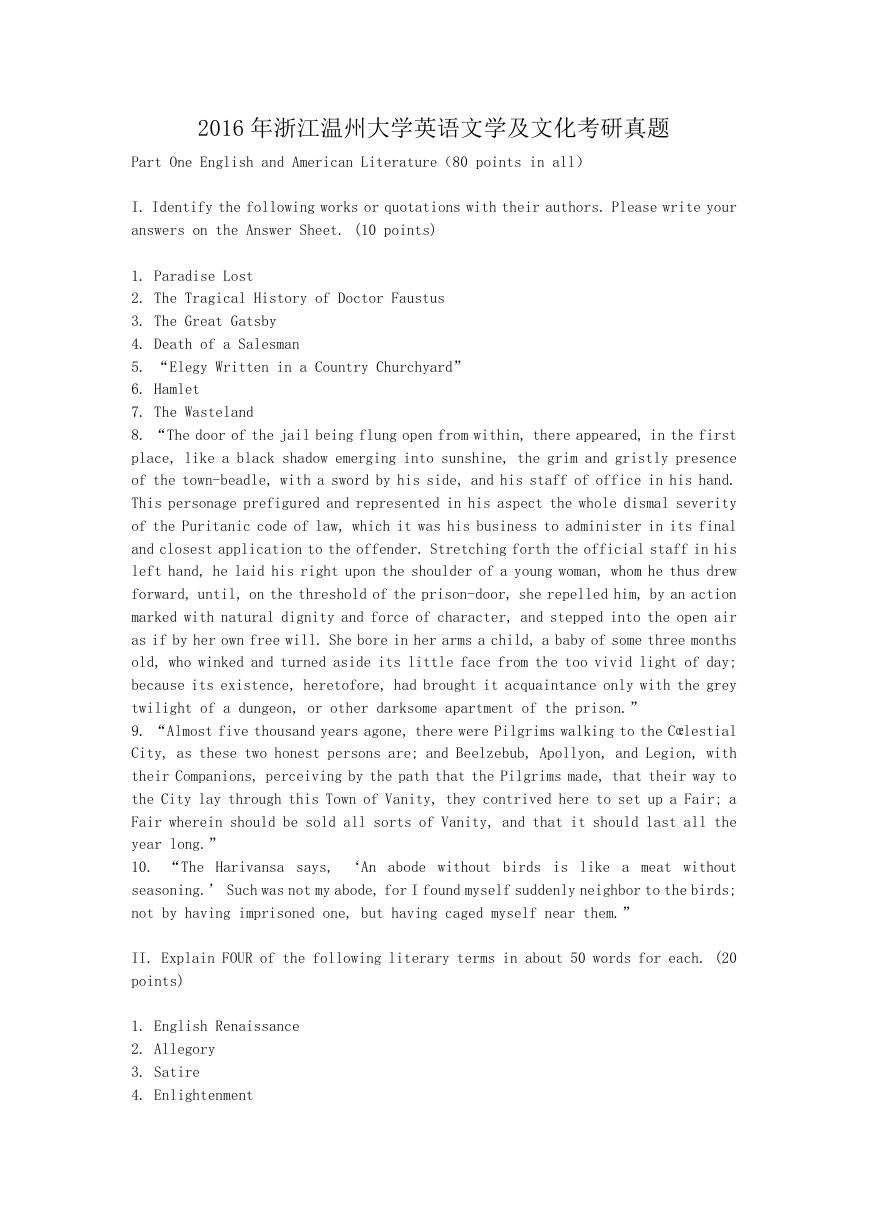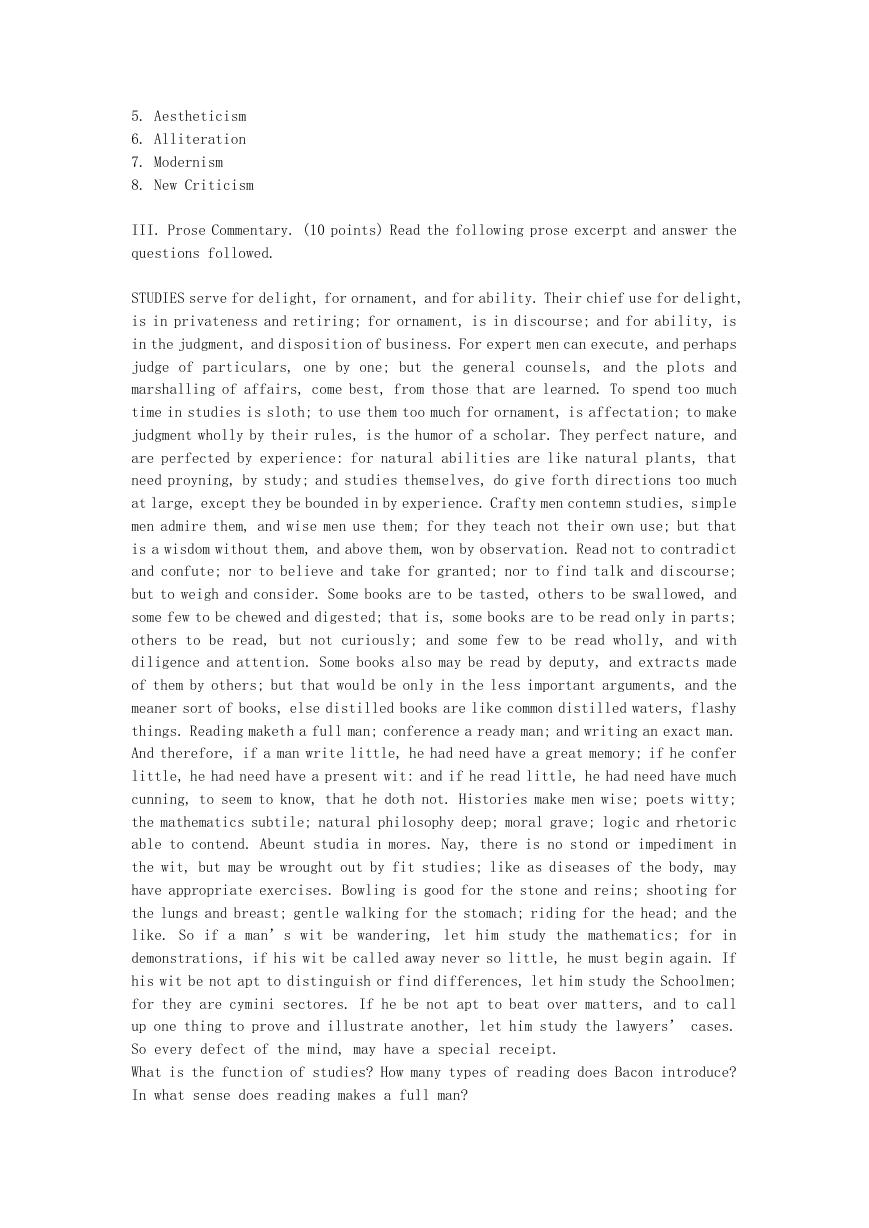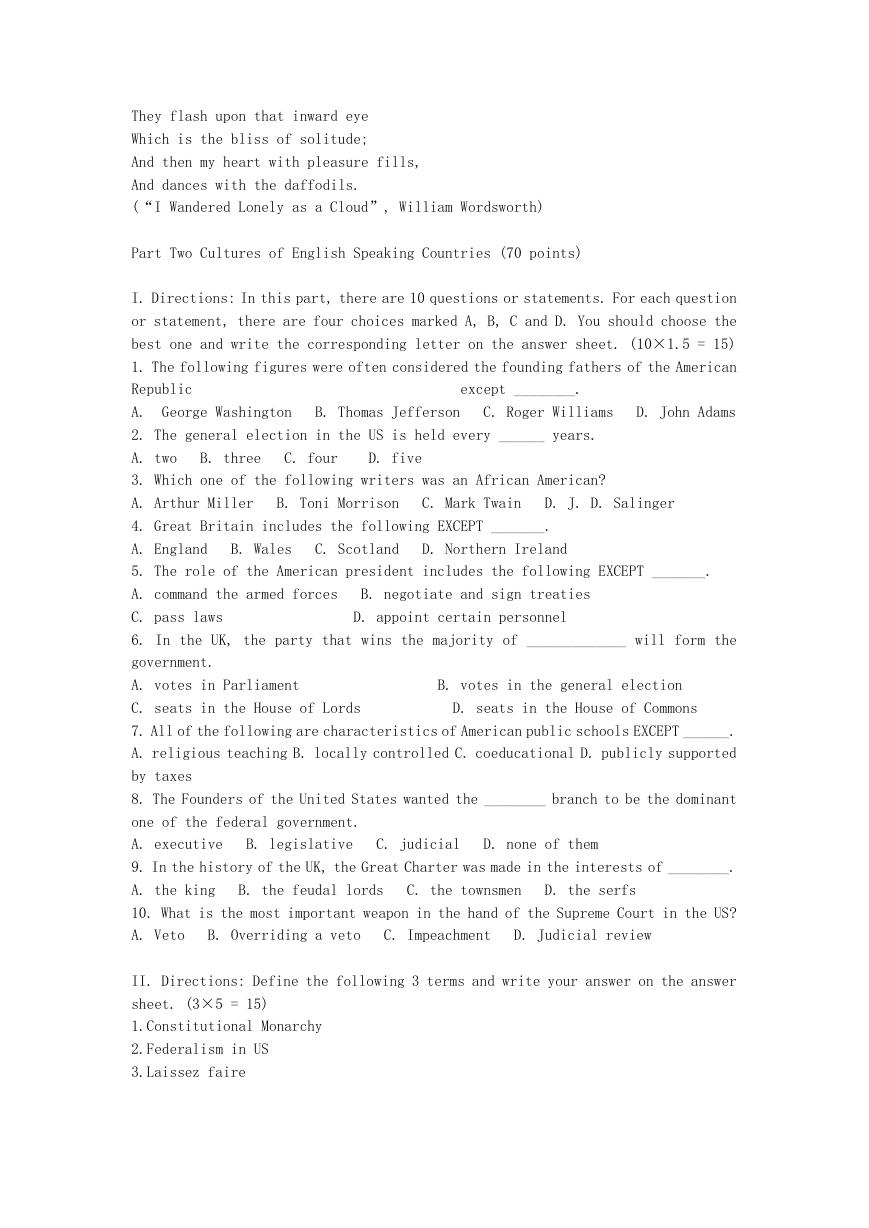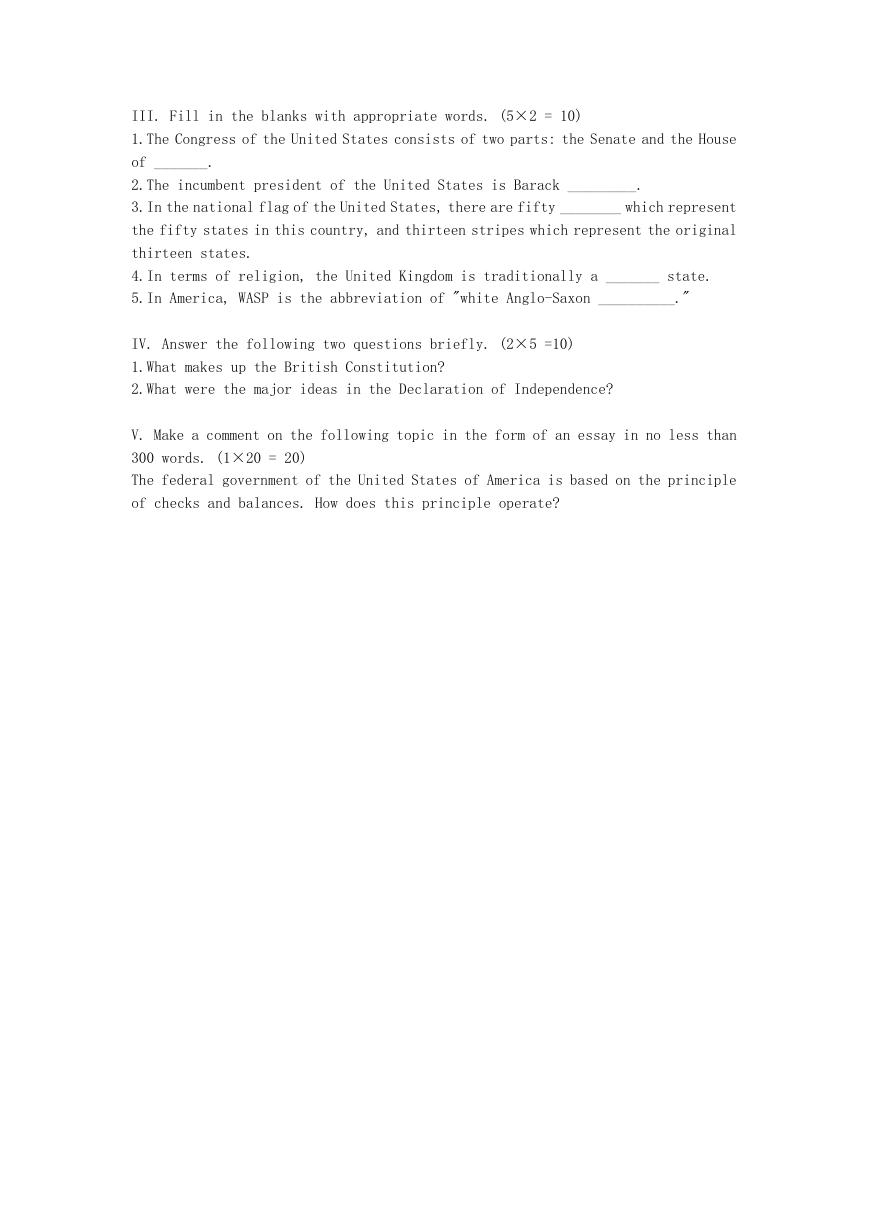2016 年浙江温州大学英语文学及文化考研真题
Part One English and American Literature(80 points in all)
I. Identify the following works or quotations with their authors. Please write your
answers on the Answer Sheet. (10 points)
1. Paradise Lost
2. The Tragical History of Doctor Faustus
3. The Great Gatsby
4. Death of a Salesman
5. “Elegy Written in a Country Churchyard”
6. Hamlet
7. The Wasteland
8. “The door of the jail being flung open from within, there appeared, in the first
place, like a black shadow emerging into sunshine, the grim and gristly presence
of the town-beadle, with a sword by his side, and his staff of office in his hand.
This personage prefigured and represented in his aspect the whole dismal severity
of the Puritanic code of law, which it was his business to administer in its final
and closest application to the offender. Stretching forth the official staff in his
left hand, he laid his right upon the shoulder of a young woman, whom he thus drew
forward, until, on the threshold of the prison-door, she repelled him, by an action
marked with natural dignity and force of character, and stepped into the open air
as if by her own free will. She bore in her arms a child, a baby of some three months
old, who winked and turned aside its little face from the too vivid light of day;
because its existence, heretofore, had brought it acquaintance only with the grey
twilight of a dungeon, or other darksome apartment of the prison.”
9. “Almost five thousand years agone, there were Pilgrims walking to the Cœlestial
City, as these two honest persons are; and Beelzebub, Apollyon, and Legion, with
their Companions, perceiving by the path that the Pilgrims made, that their way to
the City lay through this Town of Vanity, they contrived here to set up a Fair; a
Fair wherein should be sold all sorts of Vanity, and that it should last all the
year long.”
10. “The Harivansa says, ‘An abode without birds is like a meat without
seasoning.’ Such was not my abode, for I found myself suddenly neighbor to the birds;
not by having imprisoned one, but having caged myself near them.”
II. Explain FOUR of the following literary terms in about 50 words for each. (20
points)
1. English Renaissance
2. Allegory
3. Satire
4. Enlightenment
�
5. Aestheticism
6. Alliteration
7. Modernism
8. New Criticism
III. Prose Commentary. (10 points) Read the following prose excerpt and answer the
questions followed.
STUDIES serve for delight, for ornament, and for ability. Their chief use for delight,
is in privateness and retiring; for ornament, is in discourse; and for ability, is
in the judgment, and disposition of business. For expert men can execute, and perhaps
judge of particulars, one by one; but the general counsels, and the plots and
marshalling of affairs, come best, from those that are learned. To spend too much
time in studies is sloth; to use them too much for ornament, is affectation; to make
judgment wholly by their rules, is the humor of a scholar. They perfect nature, and
are perfected by experience: for natural abilities are like natural plants, that
need proyning, by study; and studies themselves, do give forth directions too much
at large, except they be bounded in by experience. Crafty men contemn studies, simple
men admire them, and wise men use them; for they teach not their own use; but that
is a wisdom without them, and above them, won by observation. Read not to contradict
and confute; nor to believe and take for granted; nor to find talk and discourse;
but to weigh and consider. Some books are to be tasted, others to be swallowed, and
some few to be chewed and digested; that is, some books are to be read only in parts;
others to be read, but not curiously; and some few to be read wholly, and with
diligence and attention. Some books also may be read by deputy, and extracts made
of them by others; but that would be only in the less important arguments, and the
meaner sort of books, else distilled books are like common distilled waters, flashy
things. Reading maketh a full man; conference a ready man; and writing an exact man.
And therefore, if a man write little, he had need have a great memory; if he confer
little, he had need have a present wit: and if he read little, he had need have much
cunning, to seem to know, that he doth not. Histories make men wise; poets witty;
the mathematics subtile; natural philosophy deep; moral grave; logic and rhetoric
able to contend. Abeunt studia in mores. Nay, there is no stond or impediment in
the wit, but may be wrought out by fit studies; like as diseases of the body, may
have appropriate exercises. Bowling is good for the stone and reins; shooting for
the lungs and breast; gentle walking for the stomach; riding for the head; and the
like. So if a man’s wit be wandering, let him study the mathematics; for in
demonstrations, if his wit be called away never so little, he must begin again. If
his wit be not apt to distinguish or find differences, let him study the Schoolmen;
for they are cymini sectores. If he be not apt to beat over matters, and to call
up one thing to prove and illustrate another, let him study the lawyers’ cases.
So every defect of the mind, may have a special receipt.
What is the function of studies? How many types of reading does Bacon introduce?
In what sense does reading makes a full man?
�
IV. Novel Commentary. (20 points)
Oscar Wilde writes, “There is no such thing as a moral or an immoral book. Books
are well written, or badly written. That is all.” Do you agree or not? Illustrate
your points with examples from your reading of English or American literature.
V. Poetry Commentary. (20 points) Write a commentary on William Wordsworth’s poem
“I Wandered Lonely as a Cloud” in relation to Wordsworth’s comments in his Preface
to Lyrical Ballads.
“The principle object, then, which I proposed to myself in these poems was to choose
incidents and situations from common life, and to relate or describe them, throughout,
as far as possible, in a selection of language really used by them; and, at the same
time, to throw over them a certain colouring of imagination, whereby ordinary things
should be represented to the mind in an unusual way; and further, and above all,
to make these incidents and situations interesting by tracing in them, truly though
not ostentatiously, the primary laws of our nature: chiefly, as far as regards the
manner in which we associate ideas in a state of excitement.”
(Preface to Lyrical Ballads, William Wordsworth)
I wandered lonely as a cloud
That floats on high o’er vales and hills,
When all at once I saw a crowd,
A host, of golden daffodils;
Beside the lake, beneath the trees,
Fluttering and dancing in the breeze.
Continuous as the stars that shine
And twinkle on the milky way,
They stretched in never-ending line
Along the margin of a bay:
Ten thousand saw I at a glance,
Tossing their heads in sprightly dance.
The waves beside them danced; but they
Out-did the sparkling waves in glee:
A poet could not but be gay,
In such a jocund company:
I gazed---and gazed---but little thought
What wealth the show to me had brought:
For oft, when on my couch I lie
In vacant or in pensive mood,
�
They flash upon that inward eye
Which is the bliss of solitude;
And then my heart with pleasure fills,
And dances with the daffodils.
(“I Wandered Lonely as a Cloud”, William Wordsworth)
Part Two Cultures of English Speaking Countries (70 points)
except ________.
B. three
C. four
D. five
B. Wales
D. J. D. Salinger
George Washington
B. Thomas Jefferson
B. Toni Morrison
C. Mark Twain
C. Scotland
D. Northern Ireland
C. Roger Williams
D. John Adams
I. Directions: In this part, there are 10 questions or statements. For each question
or statement, there are four choices marked A, B, C and D. You should choose the
best one and write the corresponding letter on the answer sheet. (10×1.5 = 15)
1. The following figures were often considered the founding fathers of the American
Republic
A.
2. The general election in the US is held every ______ years.
A. two
3. Which one of the following writers was an African American?
A. Arthur Miller
4. Great Britain includes the following EXCEPT _______.
A. England
5. The role of the American president includes the following EXCEPT _______.
A. command the armed forces
C. pass laws
6. In the UK, the party that wins the majority of _____________ will form the
government.
A. votes in Parliament
C. seats in the House of Lords
7. All of the following are characteristics of American public schools EXCEPT ______.
A. religious teaching B. locally controlled C. coeducational D. publicly supported
by taxes
8. The Founders of the United States wanted the ________ branch to be the dominant
one of the federal government.
A. executive
9. In the history of the UK, the Great Charter was made in the interests of ________.
A. the king
10. What is the most important weapon in the hand of the Supreme Court in the US?
A. Veto
B. negotiate and sign treaties
D. appoint certain personnel
D. seats in the House of Commons
B. votes in the general election
C. the townsmen
D. the serfs
C. judicial
D. none of them
B. Overriding a veto
C. Impeachment
D. Judicial review
B. the feudal lords
B. legislative
II. Directions: Define the following 3 terms and write your answer on the answer
sheet. (3×5 = 15)
1.Constitutional Monarchy
2.Federalism in US
3.Laissez faire
�
III. Fill in the blanks with appropriate words. (5×2 = 10)
1.The Congress of the United States consists of two parts: the Senate and the House
of _______.
2.The incumbent president of the United States is Barack _________.
3.In the national flag of the United States, there are fifty ________ which represent
the fifty states in this country, and thirteen stripes which represent the original
thirteen states.
4.In terms of religion, the United Kingdom is traditionally a _______ state.
5.In America, WASP is the abbreviation of "white Anglo-Saxon __________."
IV. Answer the following two questions briefly. (2×5 =10)
1.What makes up the British Constitution?
2.What were the major ideas in the Declaration of Independence?
V. Make a comment on the following topic in the form of an essay in no less than
300 words. (1×20 = 20)
The federal government of the United States of America is based on the principle
of checks and balances. How does this principle operate?
�










 2023年江西萍乡中考道德与法治真题及答案.doc
2023年江西萍乡中考道德与法治真题及答案.doc 2012年重庆南川中考生物真题及答案.doc
2012年重庆南川中考生物真题及答案.doc 2013年江西师范大学地理学综合及文艺理论基础考研真题.doc
2013年江西师范大学地理学综合及文艺理论基础考研真题.doc 2020年四川甘孜小升初语文真题及答案I卷.doc
2020年四川甘孜小升初语文真题及答案I卷.doc 2020年注册岩土工程师专业基础考试真题及答案.doc
2020年注册岩土工程师专业基础考试真题及答案.doc 2023-2024学年福建省厦门市九年级上学期数学月考试题及答案.doc
2023-2024学年福建省厦门市九年级上学期数学月考试题及答案.doc 2021-2022学年辽宁省沈阳市大东区九年级上学期语文期末试题及答案.doc
2021-2022学年辽宁省沈阳市大东区九年级上学期语文期末试题及答案.doc 2022-2023学年北京东城区初三第一学期物理期末试卷及答案.doc
2022-2023学年北京东城区初三第一学期物理期末试卷及答案.doc 2018上半年江西教师资格初中地理学科知识与教学能力真题及答案.doc
2018上半年江西教师资格初中地理学科知识与教学能力真题及答案.doc 2012年河北国家公务员申论考试真题及答案-省级.doc
2012年河北国家公务员申论考试真题及答案-省级.doc 2020-2021学年江苏省扬州市江都区邵樊片九年级上学期数学第一次质量检测试题及答案.doc
2020-2021学年江苏省扬州市江都区邵樊片九年级上学期数学第一次质量检测试题及答案.doc 2022下半年黑龙江教师资格证中学综合素质真题及答案.doc
2022下半年黑龙江教师资格证中学综合素质真题及答案.doc